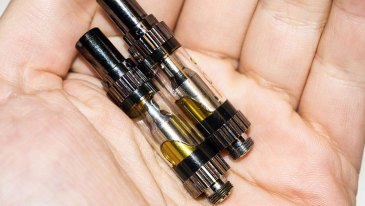
States with well-established legal markets permitting adult-use marijuana sales experienced far fewer incidences of the vaping-related lung illness EVALI (e-cigarette or vaping product use-associated lung injury) as did jurisdictions where adult-use was prohibited, according to data published in the journal Addiction.
According to the study’s corresponding press release: “A negative relationship between EVALI prevalence and rates of pre-outbreak vaping and marijuana use suggests that well-established markets may have crowded-out use of riskier, informally sourced e-liquids. Indeed, the five earliest states to legalize recreational marijuana — Alaska, California, Colorado, Oregon and Washington — all had less than one EVALI case per 100,000 residents aged 12 to 64. None of the highest EVALI-prevalence states — Utah, North Dakota, Minnesota, Delaware and Indiana — allowed recreational marijuana use.”
Commenting on the findings, NORML Deputy Director Paul Armentano said, “These results come as little surprise. In jurisdictions where cannabis is legally regulated, consumers gravitate toward the above-ground retail marketplace where they can access lab-tested products manufactured by licensed businesses.”
He added, “Just like alcohol prohibition gave rise to the illicit production of dangerous ‘bathtub gin,’ marijuana prohibition provides bad actors, not licensed businesses, the opportunity to fulfill consumers’ demand – sometimes with tragic results.”
A prior analysis, published in April in the Journal of the American Medical Association (JAMA) Network Open similarly reported, “[EVALI cases] were concentrated in states where consumers do not have legal access to recreational marijuana dispensaries. … One possible inference from our results is that the presence of legal markets for marijuana has helped mitigate or may be protective against EVALI.”
According to the US Centers for Disease Control and Prevention, nearly 3,000 people sought hospitalization because of the illness, which peaked last September, and nearly 70 people died as a result of it. Late last year, the CDC publicly identified vitamin E acetate – a diluting agent sometimes present in counterfeit, unregulated vape pen products – as a primarily “culprit” in the outbreak. Earlier this year, the agency reiterated: “Vitamin E acetate is strongly linked to the EVALI outbreak. Vitamin E acetate has been found in product samples tested by FDA and state laboratories and in patients’ lung fluid samples tested by CDC from geographically diverse states. Vitamin E acetate has not been found in the lung fluid of people that do not have EVALI.”
The abstract of the study, “Association of vaping-related lung injuries with rates of e-cigarettes and cannabis use across US states,” appears online here. The study’s accompanying press release is online here.











